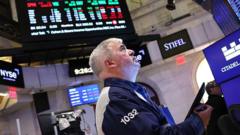A recent surge in the American stock market has emerged as a reaction to a favorable jobs report and the prospect of renewed US-China trade discussions, marking a robust comeback for the economy despite lingering trade tensions.
Wall Street Rebounds as Job Growth Surpasses Expectations Amid Trade Talks

Wall Street Rebounds as Job Growth Surpasses Expectations Amid Trade Talks
US stocks experience a significant recovery following tariff losses, buoyed by positive employment data and potential trade negotiations.
Wall Street has regained its footing after suffering losses related to President Donald Trump's tariff decisions a month ago, culminating in the longest winning streak for US stocks in two decades. In an encouraging turn of events, the S&P 500 and Nasdaq both recorded a 1.5% increase, while the Dow Jones Industrial Average rose by 1.4%. This marks the market's ninth consecutive day of gains—the longest such stretch since 2004.
The optimism was fueled by the latest data from the Department of Labor, which indicated that US employers added 177,000 jobs in April, surpassing analysts' expectations. Although this figure represents a slowdown compared to the previous month, the unemployment rate remained unchanged at 4.2%, providing further encouragement to investors.
Investors were also heartened by China's consideration of a US proposal for trade negotiations, potentially easing tensions that have resulted in the highest import tariffs globally. Analysts have expressed cautious optimism; Carl Weinberg, chief economist at High Frequency Economics, suggested that the jobs data showed no immediate signs of recession, while Seema Shah from Principal Asset Management remarked that despite expected economic sluggishness, the US economy could avoid a downturn if tariff-related issues are resolved in a timely manner.
Nevertheless, concerns linger. Olu Sonola from Fitch Ratings cautioned that the impact of Trump's tariffs would take time to fully materialize, emphasizing that while the jobs report is positive, uncertainties remain regarding the economic outlook. As Wall Street navigates these waters, the resolution of trade discussions will play a critical role in shaping the future trajectory of the economy and stock market.
The optimism was fueled by the latest data from the Department of Labor, which indicated that US employers added 177,000 jobs in April, surpassing analysts' expectations. Although this figure represents a slowdown compared to the previous month, the unemployment rate remained unchanged at 4.2%, providing further encouragement to investors.
Investors were also heartened by China's consideration of a US proposal for trade negotiations, potentially easing tensions that have resulted in the highest import tariffs globally. Analysts have expressed cautious optimism; Carl Weinberg, chief economist at High Frequency Economics, suggested that the jobs data showed no immediate signs of recession, while Seema Shah from Principal Asset Management remarked that despite expected economic sluggishness, the US economy could avoid a downturn if tariff-related issues are resolved in a timely manner.
Nevertheless, concerns linger. Olu Sonola from Fitch Ratings cautioned that the impact of Trump's tariffs would take time to fully materialize, emphasizing that while the jobs report is positive, uncertainties remain regarding the economic outlook. As Wall Street navigates these waters, the resolution of trade discussions will play a critical role in shaping the future trajectory of the economy and stock market.





















